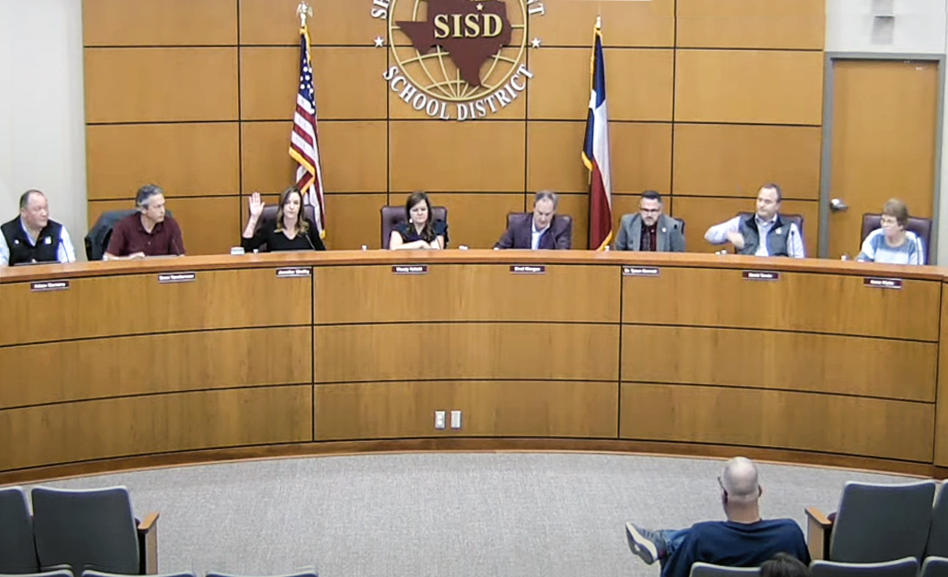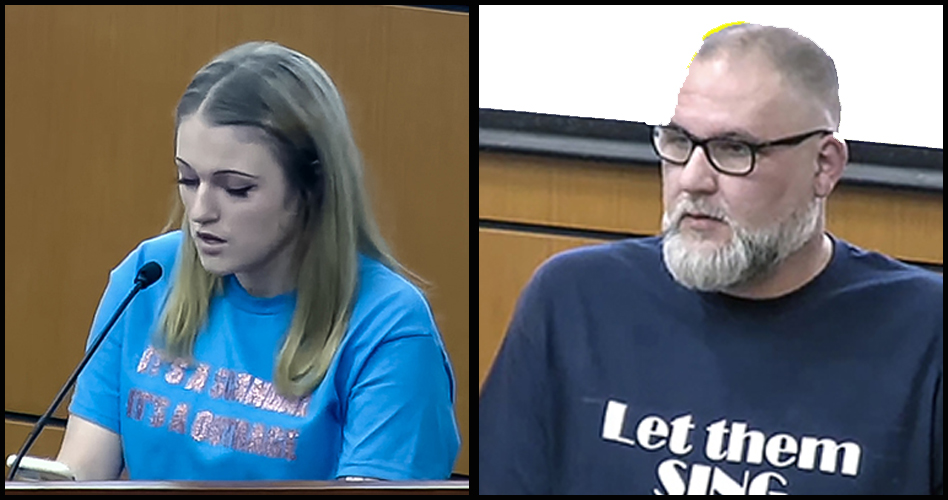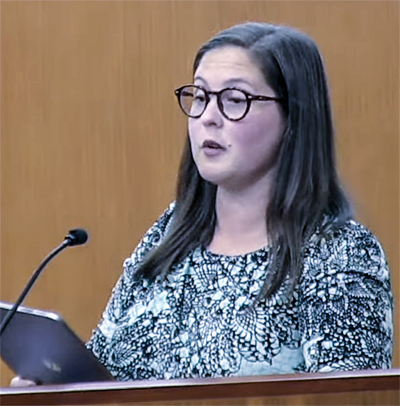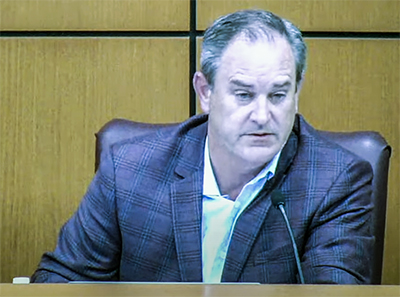
Phillip Hightower, lower right corner, watches at the Sherman ISD board votes to reinstate the production of Oklahoma! as it was originally cast
TAMMYE NASH | Managing Editor
Nash@DallasVoice.com
Here in North Texas, we are used to seeing school boards enact and uphold rules and policies unfairly targeting and discriminating against LGBTQ students, even in the face of overwhelming support for those LGBTQ students.
In fact, we saw that exact thing happen just a few months ago when the board of the Fort Worth Academy of Fine Arts enacted a policy refusing to allow a transgender student to participate in the Singing Girls of Texas Choir, even though the choir director had encouraged the student to audition, and even though the majority of those attending a school board meeting on the issue support the student.
But on Nov. 13, members of the Sherman Independent School District Board of Trustees surprised more than one person when they voted to reject the superintendent’s new policy that would have robbed a transgender student of a leading role in the school’s production of Oklahoma!
The Nov. 13 meeting last nearly six hours in total, including about two-and-a-half hours of public comment and a closed executive session lasting for about another two hours. It ended with a unanimous vote to allow the production of Oklahoma! continue with the original script and the original student cast. It also included an apology from the school board’s president, Brad Morgan, to the students, parents and the community for the uproar that had ensued over the last month.
The board will meet again at noon on Friday, Nov. 17, to consult with legal counsel in closed session to discuss “legal and procedural matters” related to recent events, followed by open session during which board members will consider taking action against the superintendent.
The background

Max Hightower
After 17-year-old senior Max Hightower was cast as Ali Hakim and two female students were cast in male roles in the Sherman High School musical, Superintendent Tyson Bennett instructed SHS Principal Scott Johnson to inform the students and their parents that only male students could play male roles, and only female students could play female roles, with “male” and “female” defined by gender markers on birth certificates.
That meant that the two female students cast in male roles would not be allowed to perform those roles. But it was obvious to everyone that the “new policy” was put in place to keep Hightower, a transgender male, from playing the role of Ali Hakim.
Max’s father, Phillip Hightower, questioned when the policy was put into place and who set it. When he couldn’t get a satisfactory answer, he went to the media, and the story blew up. Max Hightower was suddenly front page news across the country.
Over the next week, Bennett issued a statement saying that although there was no policy regarding who could play gendered roles, in this instance the “only males can play males” policy was in force. The statement said that policy would not apply to future productions, unless it did.
The statement was, Phillip Hightower said, “a word soup” that blatantly contradicted itself.
Bennett also announced the production of Oklahoma! would be delayed from mid-December, when it was originally scheduled, to sometime after Jan. 15. He also announced that because Oklahoma! was so full of adult themes, profanity and sexual content, it wasn’t really suitable for high school students anyway, so the school would instead produce the shortened and revised “youth edition.”
Then came the Monday, Nov. 13, meeting of the Sherman ISD board. A total of 66 people signed up to speak during the public comment section of that meeting, although the number was whittled down to 65 when one person didn’t show up. Of those 65, all but “five, maybe six” were there to speak in support of Max, his castmates and the originally-planned production and against Bennett’s discriminatory and contradictory “new policy” decisions.

Max Hightower’s sister Gracie, left, and his father Phillip both spoke at the school board meeting
The public comments
Phillip Hightower was the first person to step up to the podium during Monday’s public comment time, and neither the slogan on his t-shirt — “Let them sing” — nor the content of his comments left any doubt where he stands.
“I am here tonight because of misinformation. I am here tonight because people said things that did not line up with what happened,” Phillip said, explaining that he and the parents of other students in the cast had all gotten a call on Nov. 1 from Principal Scott Johnson letting them know there was a new policy in place that was “essentially banning transgender actors and actresses” in school productions.
“He said, only males can play males; only females can play females. Exact words. Verbatim,” Phillip told the school board. “This was the biggest role Max ever had. Max had a solo! This would have been the culmination of Max’s entire career [so far]. And it was ripped from him because of a new policy that was unilaterally decided by Superintendent Bennett.”
Phillip Hightower said that when he questions about the policy — when it was instituted and by whom — “got no traction at the school, I elected to call the media.”
That was when, he said, the superintendent announced that the students would be presenting the revised “youth” version of Oklahoma! — which, by the way, does not include the character of Ali Hakim and thus would also eliminate Max from the production — and then issued self-contradictory statement Phillip called a “word soup,” claiming there was no policy on gender-specific roles in student productions (except for Oklahoma!) and that no such policy would apply to future productions (unless it did).
Bennett made these decisions “unilaterally, without any input from the school board,” and these decisions “crushed these young kids, crushed their souls.”
Phillip’s old daughter — and Max’s big sister — Gracie Hightower, who studied theater at Sherman High School and now at Grayson Community College, spoke next, keeping her comments brief but issuing a clear indictment of the administration’s actions and comments.
Gracie Hightower explained how, in March 2021, but she and her little brother Max both had roles in Sherman High School’s UIL one-act play, José Rivera’s Marisol, which, she said, has “strong themes of violence against women, sexual content and hate. I was cast as a businesswoman who gets hit in the head with a golf club, [resulting in her thinking] that she is a Nazi skinhead who sets homeless people on fire.”
Although she added nothing to that description, Gracie Hightower’s meaning was clear.
Betty Price told school board members that her daughter, CJ, was one of the girls cast in a male role. “The gender criteria you created to remove [these students] from their roles violates their rights and goes against the historical precedent and the spirit of theater,” Price said.
She said Bennett’s decision to replace the play with the “youth version” was intended to “assuage your own guilt. … This is not the Bearcat way. [You are] blatantly ignoring your own goals [as stated in the district’s policies] of diversity, teamwork and student empowerment.
“You owe these kids a standing ovation, not oppression,” Price continued. “Theater transcends gender. The show might go on, but your place as an administrator is in the audience, not in the director’s chair.”
Carolyn Nicholson, noting that Oklahoma! has been produced by Sherman HS students numerous times, told administrators that their claims the musical “has mature themes and sexual content inappropriate for high school has made Sherman Independent School District a laughingstock, and has given the city a black eye by making us look backward and ignorant.”
Nicholson called the gender policy “patently ridiculous” and said the plan to switch to the revised version of the musical was “just another ruse to force someone’s reactionary personal beliefs on our district. … Students do not need a dumb-downed version of Oklahoma! They do not need to audition again. They do not need theater police.
“They do not need to be protected from mature themes in Oklahoma!” she continued. “They do need to be protected from people who find sexual content lurking behind every haystack and in every cornfield. … I urge [the school board] not to insult and humiliate our high school students and our school district and our city any further. Reinstate the real version of Oklahoma!, and let the students sing!”
A number of students from Austin College, the small, highly-lauded liberal arts college situated in Sherman, took to the podium to speak against the discriminatory policies. Most of the students were part of the college’s theater community, and more than one was also transgender.
Many of those speaking included in their remarks a “demand that the school board uphold their self-reported goals … of supporting LGBTQ+ students,” along with a demand that the board allow the students to produce Oklahoma! “and all future shows in its original form with students cast in the roles they earned,” and a demand that the board “maintain the SISD theater department as a welcoming and inclusive space.”
One young man, Leon Espinoza, told the school board members he was “risking coming out to my entire homophobic family” to appear at the meeting and speak up against the discrimination, “because this is a hill I will die on.”
Referring to earlier speakers who had quoted statistics on the number of LGBTQ youth, especially trans youth, who had considered or attempted suicide, Espinoza said, “All those statistics you have heard today about self harm, about suicide — that was me when I was younger. But the one place I never had to worry about that was the theater.
“I have been in theater since I was 4 years old. It has always been my safe space. I have been in choir since I was 11. It has always been my safe space. I have been in the Sherman community since I was 6 years old. It has never been my safe space,” he declared. “And here I am, 20 years old, fighting the same fight I started to fight when I was 4 years old.”
Amy Hoffman Sheehan told the school board that the administration’s public statements and actions “make it obvious that Max and others are being targeted for discrimination. You have a rogue superintendent who’s in violation of Title IX with no regard for the harm done to students and who is creating a legal liability and a financial risk for Sherman ISD and its taxpayers.”
It has happened before

Former SHS Choir Director Anna Clarkson
But perhaps the most telling indictment of Bennett and his motives came from Anna Clarkson, who introduced herself as a 2009 graduate of Sherman High School who was the school’s choir director from 2014 to 2017. During that time, she said, she directed four musicals: Oklahoma!, Legally Blonde, Cinderella and Singing in the Rain Jr.
When she directed Oklahoma! in 2014, Clarkson said, “There were no questions about my cast. Nor were there any questions about the cast for Singing in the Rain, when a female played [the male lead] Cosmo Brown.”
But, Clarkson continued, there were problems in 2015 when then-Assistant Superintendent of Business and Finance Tyson Bennett discovered that the planned production of the musical Legally Blonde included a gay character and a lesbian character. She said he found out about the LGBTQ characters when he read a story on the front page of the local newspaper, the Herald Democrat.
That was when, Clarkson said, Bennett called her in to ask her “how in the world I thought it was appropriate to have gay and lesbian characters in a high school production.”
Even though she already had the approval of the high school principal [who was not Scott Johnson] and the parents of all the students in the cast, Bennett insisted that she cancel the show. When he realized it was too late the cancel the show, Bennett forced Clarkson to call the licensing company for Legally Blonde to get permission to remove the gay character from the show altogether and to make the lesbian character straight. The producers, of course, refused.
The only reason the production went ahead, Clarkson said, is because there had been the front page story in the local newspaper and because several local newspapers had already paid money to sponsor the production.
“SISD’s discriminatory policies are harmful and they are illegal,” Clarkson concluded. “We see you, and we stand with Max.”
The vote and possible future action

SISD Board President Brad Morgan
After about two-and-a-half hours of public comment and a two-hour closed-door session, the board members reconvened in open session, with Board Member Wendy Velotti making the motion that the board “reinstate the original script and the original cast” of the planned production. Board member Jennifer Johnstone Shelby seconded the motion, and the seven-member board then voted unanimously to approve Velotti’s motion.
Between Velotti’s motion and the actual vote, board President Brad Morgan then offered the following apology on behalf of the school board as a whole: “We want to apologize to our students, parents and our community regarding the circumstances that they’ve had to go through to this date. We understand that our decision does not erase the impact this had on our community. But we hope that we will enforce to everyone, particularly our students, we do embrace all of our board goals, to including addressing the diverse needs of our students and empowering them for success in a diverse and a complex world. The board is committed to uphold its ethical duty, including being continuously guided by what is best for all students in our district.”
The board is set to meet at noon Friday, Nov. 17, to continue its discussion of what actions to take moving forward.
According to the agenda, the board will meet in closed session to consult with legal counsel “regarding legal and procedural matters concerning [the] theater program and personnel related to same, to include superintendent and central office administrators and high school principal.”
The board will then reconvene in open session to consider “possible action regarding duties and responsibilities of superintendent, to include possible administrative leave and designation of an acting superintendent.”











